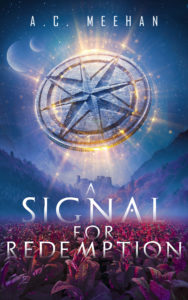Judging a book by its cover is actually Step 2. Step 1 is judging a book by its genre. I’ve been thinking about this a lot, because genre guides quite a few decisions for the author/publisher, from the tropes used in the story to the way the book is designed and marketed. Genre is revealed first on the cover, and it’s a signal to readers of what to expect. If you’re in the mood for historical romance, you don’t generally pick up a political thriller, even though there could be a love story in the thriller, which could be set in the 1920s.
The Ingredients of Fiction
I once read that all fiction contains five elements: character, dialogue, plot, conflict, and setting. That intuitively feels about right, though there are probably a thousand other ways to slice it and no doubt there are books that have extreme ratios as a literary gimmick. As a framework for thinking about genre, I like it.
Many recipes have the same standard ingredients (eggs, flour, sugar, etc.) but the way they are used can yield very different dishes—different flavors, different forms, different textures.
The elements of fiction work the same way. Each one contributes to the story, but different proportions produce different effects. And just as some combinations of ingredients make sweet desserts and others make savory entrees, the way the five elements are combined is a big part of what makes each genre distinct. For my purposes here, I see dialogue as a vehicle for exposing character, and conflict as the mechanics of plot. So for genre deliberations, I reduce the list to three: plot, character, and setting. In different genres, the movement of the story is predicated on one more than the others.
The Story’s Primary Driver Determines Genre
Plot: Thrillers tend to be characterized by action and tension. It’s all about what happens next. The same is true for mysteries. Even if you love the action hero or the amateur detective, the story hinges on the way the plot unfolds. Of course what keeps us turning the page is the combination, because it’s the way characters experience the plot that brings it to life, and stories are set in a time and place. In genres like these, though, it’s the sequence of events that makes the story what it is.
Character: In other genres, the character’s personality, choices, strengths and foibles are more prominent in the story. Character tends to be the driver for Young Adult stories, because what matters is how the protagonist moves through the world. Romance and “realistic fiction” are often character-based as well, where the way the story unfolds is driven by the unique qualities of a character.
Setting: There are also books where the setting establishes what’s possible, and therefore it is the element that most defines the genre. Fantasy and science fiction are often marked by this, because “world building” is important to the story. For instance, if the main character is a wizard, and the plot revolves around the use of magic, the book is quite likely defined as fantasy because the story is only possible if its set in a world where magic is real.
Simplistically, this works as a classification guide. But obviously there’s no story without plot AND character AND setting. And books cross genres all the time. The books I enjoy most are the ones that feel balanced on all three.
Genre Expectations
This is why I say I write character-driven science fiction. (Arguably science-fantasy.) I had to put A Signal for Redemption in a category in order to market it. Even though I consider the book to be founded on character, the story wouldn’t—couldn’t—exist outside of the particular setting. And since that setting is a world different from our own, I felt that was the aspect of the book that most defined the flavor. It seemed to me that a reader comfortable with invented settings would be most likely to reach for this one, and then could settle in to enjoy the characters. It would be interesting to market it in a character-driven genre to see what happens.
Quite a few people who read the book based on word of mouth have said something along the lines of “I don’t usually read science fiction, but I liked this book.” Avid science-fiction readers have enjoyed it, too, but haven’t said, “I don’t usually read character-driven stories, but I liked this book.” I think this dynamic validates the idea that setting is the determinate flavor of the book. Unfortunately, it also means the book wouldn’t come to the attention of people who aren’t looking for science fiction.
Science Fiction for Experimentation and Exploration
I know “science fiction” for a lot of people conjures aliens, robots, and space battles. I suspect that’s why some readers are surprised to find A Signal for Redemption categorized that way. Despite the setting and the presence of some technology (including, yes, a spaceship), the story is about how people relate to each other and the places in their lives. It’s science fiction because I needed to bend the rules of our world a little so that I could explore specific aspects of those relationships.
That’s the draw of science fiction for me. It’s a way to design experiments, to control the variables of human nature so that you can focus on the one you want to explore. I have a spaceship in my story because my characters needed transportation, and time travel because I wanted a technological reset for the society. I added a paranormal element because I wondered what would happen if empathy were a power that individuals could control. For those reasons, I needed science fiction. But the story of Signal wouldn’t run without three-dimensional characters.
Genre is tricky. It seems to me that it tends to lead to overgeneralization based on the worst examples of the category. Genre and generic stem from the same root, after all. Yet it’s a helpful tool for readers and marketers (more than writers!) in narrowing the field. I wonder if well-balanced books are harder to bring to the surface because of this dynamic. Certainly “cross-genre” fiction isn’t the easiest to market. (In fact, the advice-to-writers sites mostly say cross-genre should be avoided if one wants to sell books.)
Since I have the luxury to write for pleasure instead of payment—though I wouldn’t turn down a little more of that!—I’m not as constrained by genre as I would be if selling were my primary goal. Writing and marketing play by different rules. The quality of the story and the writing are what make a book satisfying, but quality doesn’t count until after someone decides to read it. For marketing, it’s not about quality, it’s about “findability.” Good books with bad marketing are invisible. A bad book with good marketing has a far better chance of making it to a bestseller list. Genre is about putting the book in front of the people who are most likely to pick it up.


